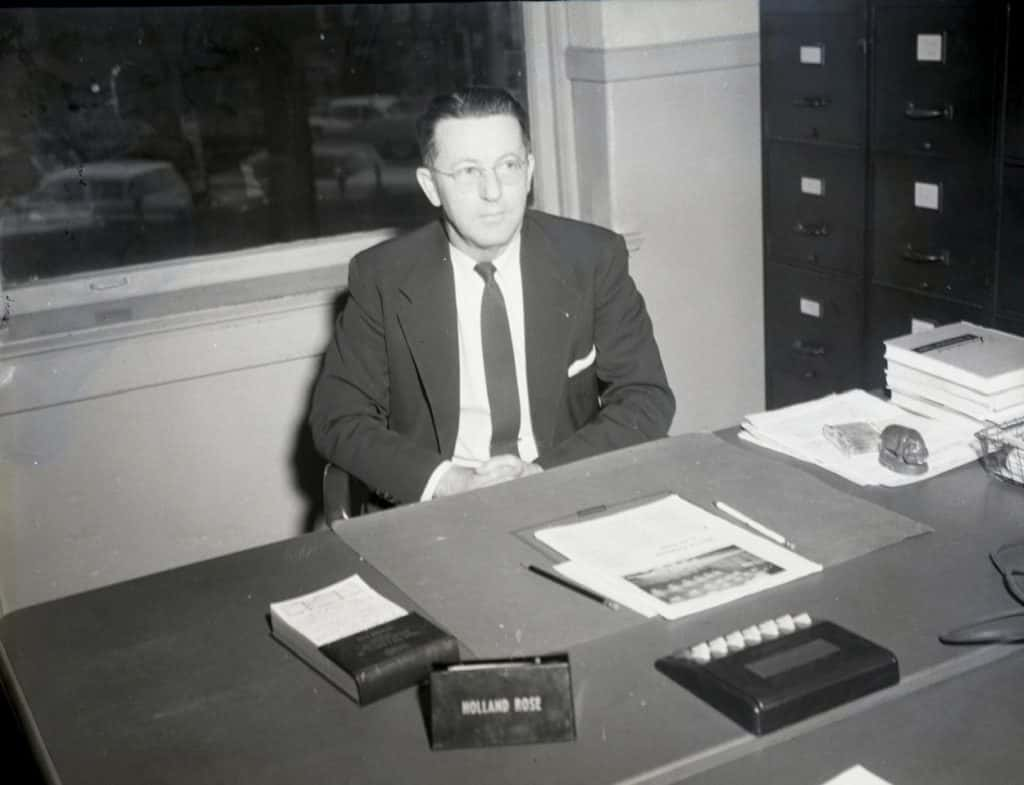Holland Rose:
The Leading Light for Marshall County Schools
Written by Justin D. Lamb
 Holland Rose at his desk in the Board Office at the Marshall County Courthouse in 1954.
Holland Rose at his desk in the Board Office at the Marshall County Courthouse in 1954.
(Photo courtesy of West Kentucky Genealogy)
Marshall County has been fortunate to have a second to none school system. However, it wasn’t always this way. In the 1930s when Holland Rose became superintendent, the school system was in terrible shape. It was the poorest in the state and was crippled by backward thinking. Rose saw opportunity for much more, and over his career, he helped lay the groundwork for Marshall County Schools System to become one of the best in the state.
Born in Hardin on September 28, 1906, Rose grew up very poor, and he walked a mile from home every morning and night to milk cows in order to pay for his education. Rose enrolled at Murray State Normal School and Teacher’s College (now Murray State University) in the summer of 1926, but ran out of money halfway through. Like many other Kentuckians during the 1920s, he soon left for Detroit in 1926 to work in the automobile factories. He saved every penny he earned, and after a year in Detroit, he returned to Murray to finish his degree. He began teaching in the Darnall one room school near Hardin to pay for his college expenses and then soon received a job as a teacher and coach at Brewers High School.
By the time Rose received his teaching degree from Murray State College in 1932, the Great Depression was weighing down hard and times were tough. Rose remained at Brewers High School until he was elected superintendent of Marshall County Schools by the county school board in a controversial split vote in 1934. The dissenting school board members had nothing against Rose, but they felt he was too young, too idealistic, and they had other political commitments. But to the ones who voted in favor of Rose, they saw a man with a progressive vision of helping the struggling schools in the county.
When Rose assumed the duties of superintendant, Marshall County had over 50 one room schools and he looked to change that. One by one with very little money in the school system treasury and resistance from some, Rose helped consolidate the 40 one room schools into 9 modern grade schools with a broad class curriculum. Rose never had much funds due to no school tax, but he remained determined to haul Marshall County schools into the modern era. The Paducah Sun-Democrat commented on Rose’s determination in 1966, “With humble persistence, quiet drive, politeness, far-sightedness, and unusual political acumen, he dragged it through the mire and muck of depression, a World War, and public lethargy into a modern circle.”
By the early 1950s, the Marshall County school system was deeply in debt even after years of hard work on the part of Holland Rose. Little state money and no federal money made things near impossible for Rose. However, he stuck it out and spoke to the citizens of the county about the need for progress. Rose’s two biggest accomplishments came in 1954 when, with very little money, Rose led the effort to consolidate 7 high schools throughout the county into North Marshall High School near Palma and South Marshall High School near Hardin. Rose had proposed a school tax for these constructions, but a conservative electorate caused the defeat of these initiatives on the ballot. Persistence paid off for Rose, however, when in 1957, the tax was placed on the ballot and finally passed by a comfortable margin. The passing of the tax allowed gymnasiums to be built at both high schools and provided a funded road for future improvements and building of new schools.
As the 1960s dawned, both North and South Marshall High Schools were accredited by the Southern Association of Secondary Schools and Colleges. Constant improvement in the school system was Rose’s career long goal. Better teachers, better buildings, better transportation so the kids of Marshall County might live better lives. However, Holland Rose’s career came to an abrupt halt as he was forced to step down as superintendant due to ill health in July 1966. Assistant Superintendent Reed Conder was chosen as his successor and went on to further Rose’s agenda.
A month after resigning his post, Holland Rose passed away on August 28, 1966 at the age of 59. He was laid to rest in Benton Cemetery. Following his death the Paducah Sun-Democrat commented, “He stayed as superintendant for all those years because he shot straight with every part of the county and was honest with every member of the board. He played no favorites. I came to find that he was for the whole county rather than just part of it.”
